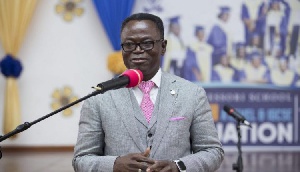A Justice of the Supreme Court of Ghana, Justice Yonny Kulendi, has, in a landmark ruling, categorically stated that no external forces or pressures can push the Supreme Court of Ghana to legalize homosexuality using capital letters to emphasize the independence of the Court.
The Supreme Court judge, in a strongly-worded concurring opinion, clearly established the position of the Court after one Dr. Obiri-Korang, a law lecturer, invoked the powers of the Court to declare section 104(1)(b) of the Criminal and Offences Act 1960 (Act29) as constitutional or otherwise.
The said provisions in the Constitution describe homosexuality or unnatural canal knowledge (Anal sex) as unlawful.
Writing the concurring opinion on behalf of his seven colleagues who served on the panel chaired by Justice Paul Baffoe-Bonnie with Justices Imoro Amadu Tanko, Avril Lovelace-Johnson, Ernest Gaewu, Yaw Darko Asare, and Agyei-Frimpong as members, Justice Kulendi did not mince words:
"I wish to state in emphatic terms that our Constitution is supreme and NOT subservient to the constitutions, and laws of other nations and jurisdictions", capitalizing the word "not" for emphasis.
He continued: "Whilst the constitutions and laws of other nations may have expressly legalized homosexuality, glorified gay marriages and by way of affirmative actions, promulgated legislation to propagate, outdoor, evangelize, preach and sell the notions of homosexuality to every fabric of those societies, Ghana as a nation, and for that matter this Court, cannot by "peer pressure" be cajoled into adopting a similar stance.
"Our Constitution is sui generis and the only one of its kind. Thus, citizens who ply this Court must do more than merely citing and referring to Constitutions of other states as well as their case law into persuading us on what the law is or ought to be in Ghana.
"Our duty as judges and the oath that we swore before assuming office was not to uphold the laws of other nations or their case law. Our oath is to uphold the Constitution and laws of the Republic of Ghana. Thus, we shall neither engage in legislative drafting nor usurp the lawmaking powers of Parliament in order to substitute our wisdom for that of the lawmakers by superimposing foreign perceptions of propriety and/or normalcy on our laws and established social structures.
"We must therefore, as judges, avoid any extent of judicial activism that will mislead us into assuming the role of Parliament. [See Republic v Fast Track High Court, Accra; Ex parte Daniels [2003-2004] SCGLR 364 at p.370]," he wrote in the 54-page ruling.
General News of Sunday, 18 August 2024
Source: mynewsgh.com
Ghana rejects homosexuality – How Justice Kulendi used 'capital letters' in landmark judgment
Entertainment












